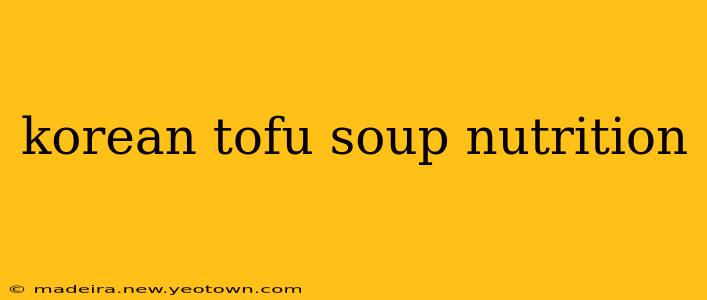Sundubu jjigae, or Korean soft tofu stew, isn't just a delicious and comforting meal; it's a nutritional powerhouse packed with protein, vitamins, and minerals. Imagine a steaming bowl, fragrant with the spicy kick of gochujang and the subtle umami of seafood or mushrooms, brimming with silken tofu, tender vegetables, and a rich, flavorful broth. This isn't just a meal; it's a culinary experience steeped in Korean tradition and brimming with health benefits. Let's dive into the nutritional details and explore why this dish deserves a spot in your healthy eating plan.
What are the main ingredients in Korean tofu soup?
The beauty of sundubu jjigae lies in its adaptability. While the base always includes soft tofu (sundubu), the other ingredients can vary widely depending on regional preferences and individual tastes. However, some common components include:
- Soft Tofu (Sundubu): This is the star of the show, providing a substantial source of plant-based protein and isoflavones, which are associated with various health benefits.
- Gochujang (Korean Chili Paste): This fermented soybean paste adds a spicy kick and depth of flavor. It also contributes probiotics beneficial for gut health.
- Gochugaru (Korean Chili Flakes): These add further spice and vibrant color.
- Seafood (optional): Many variations include clams, mussels, or shrimp, boosting the protein and mineral content, particularly zinc and selenium.
- Vegetables (optional): Common additions like mushrooms, onions, green onions, and zucchini contribute vitamins, minerals, and fiber.
- Egg (optional): A raw egg is often cracked into the simmering stew, creating a creamy texture and adding protein.
- Broth: Typically a dashi-style broth, often using anchovies or kelp, contributes umami flavor and essential nutrients.
What are the health benefits of eating Korean tofu soup?
The nutritional profile of sundubu jjigae is impressive, offering a diverse range of benefits:
- High in Protein: The tofu and optional seafood provide a significant amount of protein, essential for building and repairing tissues, supporting a healthy immune system, and promoting satiety.
- Rich in Isoflavones: Tofu is a good source of isoflavones, plant compounds with potential antioxidant and anti-inflammatory properties, potentially linked to reduced risk of certain chronic diseases.
- Excellent Source of Vitamins and Minerals: The vegetables and optional seafood contribute a wealth of vitamins (A, C, K) and minerals (calcium, iron, zinc).
- Good Source of Fiber: The vegetables and tofu provide dietary fiber, promoting healthy digestion and gut microbiota.
- Probiotic Rich: The fermented gochujang contributes probiotics, beneficial bacteria supporting gut health and immune function.
- Low in Calories and Fat: Compared to many other protein-rich dishes, sundubu jjigae is relatively low in calories and fat, making it a suitable choice for weight management.
Is Korean tofu soup good for weight loss?
Yes, Korean tofu soup can be part of a healthy weight loss plan. Its high protein and fiber content contribute to satiety, helping you feel fuller for longer and potentially reducing overall calorie intake. Furthermore, its relatively low calorie and fat content makes it a weight-conscious option. However, remember that the addition of ingredients like seafood or extra oil can increase the calorie count.
Is Korean tofu soup good for diabetics?
Due to its low glycemic index and high fiber content, Korean tofu soup can be a suitable part of a diabetic-friendly diet. Fiber helps regulate blood sugar levels, preventing spikes after meals. However, the amount of gochujang and the type of broth used can impact the glycemic load, so it's essential to consider these aspects when preparing the stew for diabetic individuals.
Is Korean tofu soup good for gut health?
Absolutely! The presence of fermented gochujang introduces beneficial probiotics to your gut, supporting a healthy gut microbiome. Additionally, the fiber content from vegetables and tofu feeds the good bacteria in your gut, promoting digestive health.
What are the potential downsides of eating Korean tofu soup?
While generally healthy, there are potential downsides to consider:
- Sodium Content: The broth and seasonings can be high in sodium, particularly if commercially produced broths are used. Individuals with high blood pressure should be mindful of this.
- Spice Level: The chili paste and flakes can be quite spicy, potentially unsuitable for those with sensitive stomachs.
- Allergies: Be aware of potential allergens like seafood, soy, and eggs.
In conclusion, Korean tofu soup (sundubu jjigae) is a delicious and nutritious meal that can be a valuable addition to a healthy diet. Its versatility, nutritional richness, and comforting nature make it a dish worth exploring and enjoying. Remember to adapt the recipe to your dietary needs and preferences to maximize its health benefits.

